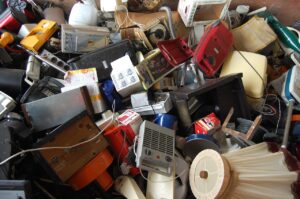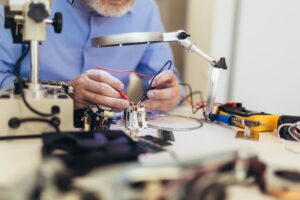
Apple lockert Ersatzteil-Politik
Apple stellt freien Reparaturbetrieben künftig iPhone-Ersatzteile, Diagnosewerkzeug und Reparaturinformationen zur Verfügung. In der Vergangenheit war der Hersteller nicht gerade bekannt für seine Offenheit gegenüber der Reparatur durch Dritte. Mit der Entscheidung reagiert Apple laut eigener Aussage auf die Wünsche seiner Kunden, aber auch das globale Engagement für ein Recht auf Reparatur dürfte nicht spurlos am Unternehmen vorbeigegangen sein.
Der Schritt von Apple ist begrüßenswert, auch wenn das Programm einige Wermutstropfen beinhaltet – so soll es zunächst zum Beispiel nur in den USA gelten. Außerdem behält Apple sich das Recht vor zertifizierte Reparateure jederzeit ohne Angabe von Gründen aus dem Programm auszuschließen. Das meint Ifixit, Mitglied des Runden Tisches Reparatur, dazu:
Apple Now Offers Genuine Parts and Tools to Independent Repair Shops, But We Have Questions
Autor: Kevin Purdy
Apple announced today that it will offer genuine parts, diagnostic tools, and repair manuals to independent repair shops. It’s a bold move from a company that has lobbied against Right to Repair bills, and a concession to the reality of iPhone owners’ needs. But we still have questions.
Repair businesses with a technician certified through Apple can apply to join the Independent Repair Provider program for free. Once approved, they can, according to Apple, buy genuine Apple parts at the same cost as the more than 5,000 repair stores in Apple’s Authorized Service Providers program. Independent shops also gain access to “tools, training, repair manuals and diagnostics,” which presumably would allow them to overcome issues like unverified batteries, Touch ID authorization (a.k.a. Error 53), missing True Tone displays, and other issues that have dogged third-party Apple repair. But independent shops will not bear the label of an Apple Authorized Service shop, a notable, if seemingly small, difference.
Apple states that it had “launched a successful pilot with 20 independent repair businesses” around the world to offer genuine parts. This seems to allude to the Genuine Parts Repair program we saw leaked in March, and which we heard about from larger repair chains. Today’s news makes the program seem, at least on its face, open to single-site and sole-proprietor independent repair shops as well, which is big, good news.
But if the pricing is the same as the sheets we saw back then, it may be difficult to get customers to pony up for third-party repairs that cost more than a trip to the Apple Store. In those documents, batteries ranged from $16-$33 for the iPhone 6s through the XS Max, which is modest and normal. Screens, however, cost up to $350 in the case of the XS Max, which is $20 more than Apple’s own out-of-warranty repair cost, before the independent shop even factors in their own labor costs and margins.
It’s unclear from today’s release whether offering genuine parts for sale to this larger network will increase the range of repairs that shops can provide. In those leaked documents, we saw parts for screens, batteries, cameras, speakers, receivers, and vibration (aka the Taptic Engine). Some of those related repairs would typically require a phone to be sent into Apple, rather than repaired on-premises in a store or Authorized Service Provider.
Apple is offering the tools and means for independent repair shops to fully restore broken iPhones, which is as it should be. We do, however, have questions about how Apple will decide who counts as “established” and “certified.” Apple’s page about its Independent Repair Program notes that it “reserves the right to reject any application without comment,” and it asks applicants to include “Previous experience or history with Apple as a Service Provider or Reseller.” We would presume that last part is not mandatory, but it could give some shops priority if there’s a long queue, or quotas.
And while it goes much of the way toward an open repair market, high prices could still weaken the incentive for all reputable repair firms, and individuals, to have a shot at keeping iPhones working longer. By offering this program, Apple is in some ways admitting that much of the lobbying it has done against Right to Repair, on loose warnings about “safety” and “hacking,” has been inherently false. The access Apple is offering independent repair shops is the same access they said would turn Nebraska into a “mecca for hackers.” And there is a danger in allowing companies to set the terms of their own repair programs, rather than making such access to parts and tools mandatory for all firms that offer repair.
Obviously, today’s news shows that regular people are capable of fixing Apple’s phones. We’re hoping this means that soon enough, everybody will be able to.






